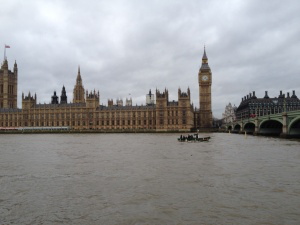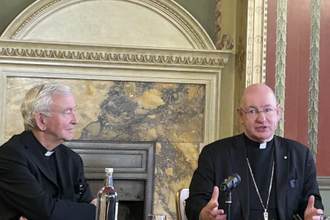London: Politicians and Church leaders take solidarity boat trip on World Migrant Day

refugee boat dwarfed by Houses of Parliament
World Migrant Day was marked with vigils, meetings and films around the globe yesterday. In a demonstration of solidarity, in London, a group of two bishops, three MPs, a nun, a priest and an artist sailed past the Houses of Parliament in TO6411, a tiny migrant boat, that previously sailed from North Africa to Italy. When the boat reached Lampedusa 18 months ago, it was crammed with 36 passengers, among them children and a heavily pregnant woman, who had to be rescued by the Italian coast guard.
The passengers yesterday were Sarah Teather MP, Chair of the All-Party Parliamentary Group on Refugees; Chair of the Home Affairs Select Committee; Simon Hughes MP, Deputy Leader of the Liberal Democrats; Rob Flello MP; Canon Pat Browne, RC Duty Priest to Parliament; Anglican Bishop Jonathan Clark; Sister Margaret Baxter, Bishop John Arnold from the Diocese of Westminster and artist Lucy Wood.
Artist Lucy Wood, who has specialised in documenting the lives of migrants in several countries, visited Lampedusa in 2010 and said she was struck by the contrast between the lively tourist boats arriving in the harbour and the desolate, silent scene as little vessels from Africa, crammed with silent, tired, thirsty people were met on the dock by ambulance and police. "You could see many of them were really ill" she said.
Lucy got permission from Italian president Berlesconi to take the boat to England. She also wrote to Pope Francis asking him to bless it. After taking a short navigation course and getting the boat repaired, she set off on the 20 June, sailing to England through the Mediterranean and the European waterways. She arrived in England on 5 October. "Apart from replacing the engine, I've kept the boat in the same condition it was when I got it. There were bits of food and clothing, and two lifejackets." Lucy says she wants people to see the boat to help them understand the conditions in which the refugees travel. " Each person paid £1,000 to travel on this" she said. "It's a very unstable vessel with no washing or toilet facilities. The river authorities here wouldn't all more than seven passengers. "
Before boarding, Sister Margaret Baxter who works with the Jesuit Refugee Services, "It takes a desperate situation to make people risk their lives on a journey like this. These people are fleeing from horrendous situations, and yet they are treated so badly with little attention paid to international las meant to protect them. What has happened to our justice system that allows this? No one has any idea of what they've been through. I was in Rwanda years ago and still have memories that haunt me. "
Bishop Clark said: "I'm coming in this trip because I believe migrants should be celebrated not denigrated."
Simon Hughes MP, said: "People in positions of power, living in relative comfort, must be aware of the impact of the decisions thry make that affect the lives of thousands of people around the world. Today's short trip is a symbol of the journey which thousands of people take each year to flee from violence and seek a better life."
After the boat trip, there was a meeting of the All Party Parliamentary Group on Refugees, at Portcullis House, introduced by chair Sarah Teather MP.
Bishop John Arnold, lead bishop for CAFOD, said it was very significant that Pope Francis had made his first public journey to Lampedusa, to meet survivors of a refugee boat which sank and the islanders who were helping them. Pope Francis began his papacy by saying he wants 'a poor church for the poor'. Bishop John pointed out that there were other issues forcing people to leave their homelands, such as religious persecution; conflicts and natural disasters. "In Evangelium Gaudi, Pope Francis says, there are seven billion people on this planet we must find a way of living together. "We are all missionary disciples."
Some have accused Pope Francis of being a Marxist, Bishop John said that is not the case, but Pope Francis points out the failings of unfettered capitalism. ( Pope Francis said there was the promise that when the glass was full it would overflow and the poor would benefit, but instead the glass just keeps getting bigger and does not overflow.)
Bishop John recalled a recent visit to Bolivia, with a a population of ten million, which has a small extremely rich elite, but where six million are considered 'poor' and two million are 'desperately poor'. "The problem with capitalism is that it makes people absurdly wealthy," he said.
Clarissa Azkoul from the International Organisation for Migration, gave an overview of how European countries are dealing, (or not dealing) with the problem. She outlined a series of proposals through which EU countries could work together better to assist migrants.
Maurice Wren Chief Executive of Refugee Council echoed her views. He said the dramatic decrease in the number of refugees coming to UK lately is not a reflection on the driver of forced migration - rather the reverse. "There is a plethora of border controls preventing refugees reaching us." he said. "The dangerous journeys they undertake are not 'adventures'. "many have no choice. If we were in their position we would do just the same."
Mr Wren called for a common EU asylum policy which is adequately resourced, and pointed out that at the present time the frontier agency which has a budget of £70million has just one person running it! "This imbalance has to be addressed" he said. "Building higher walls, more punitive gatekeeping is not going to work. Poverty, inequality, war and violence is driving people out, while here at home the issue is made worse by poverty, austerity and scapegoating". He also blamed "the prevalence of the arms industry" and "the tolerance of proxy wars ."
"What is needed is political leadership" he said. "Two generations ago, a Europe without borders would have been unheard of. We've got to stop treating migration as a marginal issue."
Another speaker at the meeting was Gulwali Passarlay, who is now a student and 'young ambassador for refugees and asylum seekers'. He gave a harrowing description of how he came to leave Afghanistan with his brother at the age of 12. His father had been killed and they were under pressure to either join the Taliban or Afghanistan army. Their journey on foot or hidden in trucks, took them to Pakistan, Turkey, Iran and Bulgaria and many countries in Europe, "Each country arrested us and put us in jail," he said. They made one journey in a boat like the TO6411 which was crammed about 100 people. When the sea got rough Gulwali said he wasn't afraid of death, but he was worried that if he died his family wouldn't be able to find his body. "My faith helped me to survive" he said. "Now I want to help others. I miss my mother. I haven't seen her for seven years."
For more information on the boat see: www.to6411.net/boat.html
and www.lucywood.net/index.html
See also: ICN 19 December 2013 A deadly year for migrants www.indcatholicnews.com/news.php?viewStory=23841















